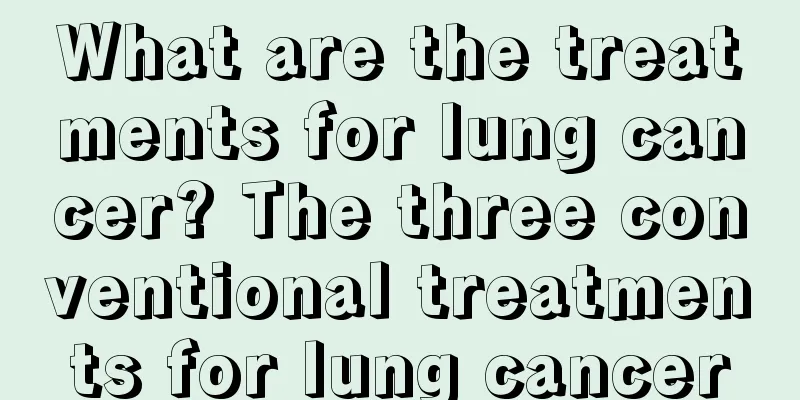What are the treatments for lung cancer? The three conventional treatments for lung cancer

|
Surgery is the first choice for the early treatment of lung cancer. The indications and types of surgery are mainly based on the site and extent of tumor invasion and the patient's general condition, especially the cardiopulmonary function reserve. The principle of surgery is to completely remove the lesion and preserve healthy lung tissue to the maximum extent. Lung cancer can cause death when it is severe. Now more and more people are harmed by lung cancer. Once the symptoms of lung cancer appear, we must seek timely treatment and take some care in life to make the condition recover faster. What are the treatments for lung cancer? I believe this is also a concern of many patients. The following is an introduction to the treatment of lung cancer. Treatments for lung cancer 1. Surgical treatment Surgery is the first choice for the early treatment of lung cancer. The indications and types of surgery are mainly based on the site and extent of tumor invasion and the patient's general condition, especially the cardiopulmonary function reserve. The principle of surgery is to completely remove the lesion and preserve healthy lung tissue to the maximum extent. Radical lobectomy should be performed as much as possible for early stage lung cancer. While completely removing the primary cancer and clearing the hilar lymph nodes, healthy lung tissue should be preserved as much as possible to achieve the goal of survival. Patients with advanced stage lung cancer should strive to surgically remove the primary tumor and metastatic lymph nodes as much as possible, and at the same time be supplemented with radiotherapy, chemotherapy and other treatments. Generally speaking, 20% of patients are suitable for surgical treatment. 2. Chemotherapy It plays an important role in the treatment of lung cancer. According to the current view, whether it is early or late stage, whether it is surgery or radiotherapy, it must be combined with chemotherapy to improve the survival rate. For small cell lung cancer with a clear diagnosis, a course of induction chemotherapy should be carried out before surgery, and then surgical resection should be performed. Chemotherapy should be continued after surgery. Adenocarcinoma and large cell carcinoma can be treated with regular chemotherapy after surgery. For late stage or lesions that cannot be surgically removed, local infusion chemotherapy can also be performed through the bronchial artery. Radiation pneumonia may occur during radiotherapy and within 1 month after radiotherapy. Acute radiation pneumonia is accompanied by high fever, chest pain, cough, shortness of breath, etc. Colds and upper respiratory tract infections are its causes, so you should keep warm and prevent colds, especially in winter. 3. Molecular Targeted Therapy Radioimmunotherapy is a new treatment method after chemotherapy and radiotherapy for tumors, and is known as a "biological missile". This method combines the targeting of monoclonal antibodies with the strong killing effect of radionuclide internal irradiation, and has the characteristics of good efficacy and low side effects. Molecular targeted drugs do not target killing tumor cells, but target molecules that are specifically expressed or highly expressed on or in the tumor cell membrane or in the cell. This can not only act more specifically on tumor cells, blocking their growth, metastasis or inducing their apoptosis, but also reduce the killing effect on normal cells at the same time. The treatment of lung cancer generally uses the three methods mentioned above. Due to the rapid development of lung cancer, complex causes, and many confounding factors in treatment, in order to reduce blind and inappropriate treatments, it is very necessary to clarify standardized and guiding treatment plans so that patients can achieve the most effective treatment effects at the most economical cost. |
<<: Does liver lesion necessarily mean liver cancer? The specific cause of liver lesions is revealed
>>: Why is liver cancer prone to recurrence? The reasons for liver cancer recurrence are as follows
Recommend
The difference between bone grinding and bone cutting, pay attention to these aspects
Bone grinding and bone shaving are both common me...
The dangers of wearing earrings to sleep
Many people wear earrings when they sleep, but th...
What to do if your nose is dry and cracked in winter
The weather in winter is relatively cold and dry....
What’s going on when I have a headache and want to vomit but can’t?
Headache is a common condition. There are many ca...
Can green radish be placed in the bedroom?
Many people like to place some green plants at ho...
How can patients with liver disease prevent liver cancer? To prevent liver cancer, you should do this
Liver disease is a common disease. It is neither ...
Which hospital is best for rectal cancer surgery
Rectal cancer is an important cancer that endange...
How to regulate your body, do you know how to regulate your body?
The body is the capital of revolution, so we shou...
How to exercise neck muscles
For girls, the accuracy of weight loss depends on...
Can I wear nail polish when I am pregnant?
During pregnancy, there are many things that preg...
A 70-year-old patient with chronic gastritis was diagnosed with early esophageal cancer during a physical examination. This diagnosis played a key role.
For tumor diseases, we have always emphasized ear...
How to treat advanced lung cancer? Six suggestions for the treatment of advanced lung cancer
Lung cancer is a very common disease in today'...
What medicine should I take for bad breath
Many people know that a person's fresh breath...
How should lung cancer be treated with health preservation?
The stubbornness and incurability of lung cancer ...
What causes sinusitis?
Sinusitis is a disease problem that affects many ...









